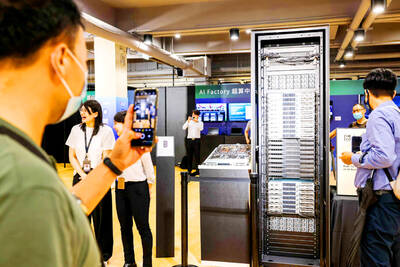Japanese electronics manufacturer Sharp Corp has decided to shut down its Kaohsiung-based subsidiary, Sharp Electronics Co (夏普電子), it said in a press release on the parent company's Web site on Friday.
The subsidiary company's 396 local employees will be laid off after the company completes its relocation of manufacturing plants to China in March 2009 -- a decision reached at a director's meeting on Friday.
The Chinese-language Apple Daily said Sharp Japan has closed two overseas branches this year, including a Taipei-based research and development center in August.
Employees were shocked by the parent company's sudden decision, according to a manager from Sharp Electronics interviewed by the Apple Daily who wished to remain anonymous.
"They felt efforts they have put in this company were unappreciated and the decision made by the directors was unfair," he said.
Sharp Electronics, founded in 1986 with an initial capital of NT$556 million (US$17.2 million), specializes in manufacturing and sales of electronic components while serving as a supplier of thin-film-transistor liquid-crystal-display (TFT LCD) module products, which help improve image quality for Taiwanese LCD manufacturers.
As most of its peer Taiwanese LCD manufacturers moved to China, Sharp Electronics said that it has met difficulties in continuing its business in Taiwan.
Sharp Japan and Taiwanese Sampo (
From the company's first 13-inch Aquos LCD TV, launched in 2001, Sharp developed the world's largest LCD TV -- 108 inches -- this year.
However, if the US subprime mortgage crisis worsens, the demand for LCD panels may decline, as LCDs are viewed as a luxury product. In the US, the most popular LCD TVs on the market are 32-inch models made by Vizio Inc -- not by Sharp, Sony or Samsung.
"Sales of LCD TVs that are 40 inches and above have declined dramatically since mid-July," Sharp Japan president Mikio Katayama said.
According to Sharp's Web site, the company currently has three affiliated companies in China.
The company's Nanjing affiliate manufactures and sells consumer electronics and electronic components, while two other companies in Wuxi focus on the manufacture and sale of electronic components.

LIMITED IMPACT: Investor confidence was likely sustained by its relatively small exposure to the Chinese market, as only less advanced chips are made in Nanjing Taiwan Semiconductor Manufacturing Co (TSMC, 台積電) saw its stock price close steady yesterday in a sign that the loss of the validated end user (VEU) status for its Nanjing, China, fab should have a mild impact on the world’s biggest contract chipmaker financially and technologically. Media reports about the waiver loss sent TSMC down 1.29 percent during the early trading session yesterday, but the stock soon regained strength and ended at NT$1,160, unchanged from Tuesday. Investors’ confidence in TSMC was likely built on its relatively small exposure to the Chinese market, as Chinese customers contributed about 9 percent to TSMC’s revenue last

With this year’s Semicon Taiwan trade show set to kick off on Wednesday, market attention has turned to the mass production of advanced packaging technologies and capacity expansion in Taiwan and the US. With traditional scaling reaching physical limits, heterogeneous integration and packaging technologies have emerged as key solutions. Surging demand for artificial intelligence (AI), high-performance computing (HPC) and high-bandwidth memory (HBM) chips has put technologies such as chip-on-wafer-on-substrate (CoWoS), integrated fan-out (InFO), system on integrated chips (SoIC), 3D IC and fan-out panel-level packaging (FOPLP) at the center of semiconductor innovation, making them a major focus at this year’s trade show, according

DEBUT: The trade show is to feature 17 national pavilions, a new high for the event, including from Canada, Costa Rica, Lithuania, Sweden and Vietnam for the first time The Semicon Taiwan trade show, which opens on Wednesday, is expected to see a new high in the number of exhibitors and visitors from around the world, said its organizer, SEMI, which has described the annual event as the “Olympics of the semiconductor industry.” SEMI, which represents companies in the electronics manufacturing and design supply chain, and touts the annual exhibition as the most influential semiconductor trade show in the world, said more than 1,200 enterprises from 56 countries are to showcase their innovations across more than 4,100 booths, and that the event could attract 100,000 visitors. This year’s event features 17

Hon Hai Precision Industry Co (鴻海精密), which assembles servers for Nvidia Corp, yesterday said that revenue last month rose 10.61 percent year-on-year, driven by strong growth in cloud and networking products amid continued front-loading orders for artificial intelligence (AI) server racks. Consolidated revenue expanded to NT$606.51 billion (US$19.81 billion) last month from NT$548.31 billion a year earlier, marking the highest ever in August, the company said in a statement. On a monthly basis, revenue was down 1.2 percent from NT$613.86 billion. Hon Hai, which is also a major iPhone assembler, added that its electronic components division saw significant revenue growth last month, boosted